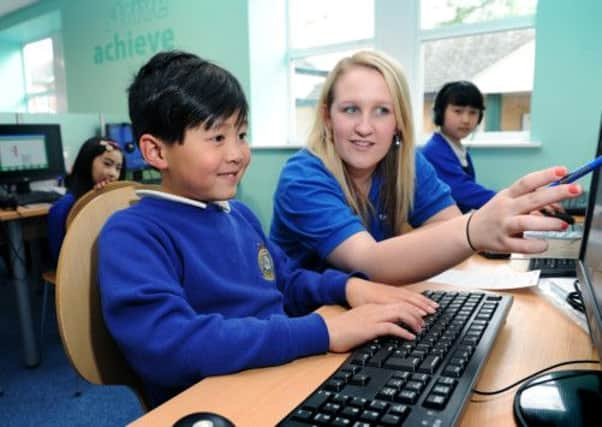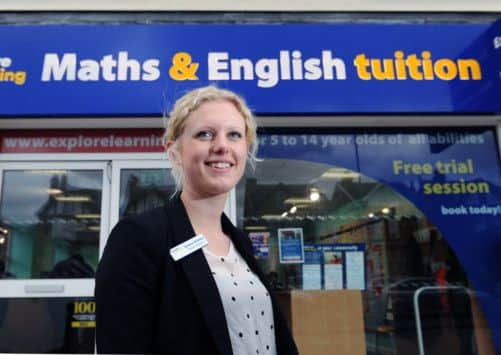A growth industry born out of fear of our children failing crucial exams


Hennah, 19, believes she would never have made it to University without the help of her private tutor.
The Leeds nursing student is one of thousands of Yorkshire youngsters whose parents have signed them up to get additional out of school hours tuition to boost their learning and get through exams.
Advertisement
Hide AdAdvertisement
Hide Ad“I definitely needed a tutor for my nursing course,” says Hennah, who is now in her first year at Leeds Met University.


“We had sessions once a week, and we went over the stuff I did at school.
“My school science teacher was really bad. The classes were just monotonous. She was not engaging me in the subject. She just copied it out of the textbook, and talked at us.
“And I don’t learn like that.”
Hennah explains that her class of 30 biology students had dropped to nine by the second year of her A-Levels – and her mum decided to take drastic action.
Advertisement
Hide AdAdvertisement
Hide Ad“My tutor had knowledge of the subject but he also wanted to teach it,” says Hennah. “He was passionate about the subject and he simplified it for me. I wish my biology teacher had been more like him.
“I don’t think I would have got into university without him.”
Hennah’s mother paid £25 an hour for the extra tuition. The single mum was jobseeking at the time, so the booster classes didn’t come cheap. But she says Hennah’s tutor, a final year medical student who was supplementing his own income, was ”worth every pound” of the £1,000 she spent over six months.
“People want their kids to succeed at any cost, it’s becoming more of a necessity now for many,” she said. “I think Hennah’s school let her down, and let a lot of those kids down. We needed the tutor – he was a very good investment.”
Advertisement
Hide AdAdvertisement
Hide AdA recent survey by EdPLace, which provides subscription-based online educational resources for parents, found that UK parents now spend £6bn a year on private tuition. The survey also found that more than a quarter of families now use private tutors to supplement their children’s education.
They pay, on average, £22 per hour, equating to £2,758 per child every year.
One in three parents who used private tutors admitted they didn’t believe schools were providing adequate support. Preparations for SAT exams were cited as a key factor for the extra coaching.
Private tuition certainly seems to be booming in Yorkshire.
A simple internet search reveals a huge proliferation of agencies and individuals offering private tuition in the region
Advertisement
Hide AdAdvertisement
Hide AdAmong them is Explore Learning, based in Harrogate Road, Moortown, Leeds, which is part of a national network of learning centres offering extra-curricular maths and English tuition to children up to 14.
Opened just six months ago, the maths and English tuition provider – one of 78 centres across the country – already has more than 120 children coming through its doors regularly for booster sessions of one hour and 15 minutes.
Parents pay £98 a month for twice-weekly sessions, which see children doing a mixture of computer-based exercises designed to help with their numeracy and literacy.
Children from grammar schools learn alongside youngsters from inner-city schools, and families on income support can use the centre, using working tax credits and childcare vouchers to pay for it.
Advertisement
Hide AdAdvertisement
Hide AdNone of the staff are qualified teachers. The tutors tend to be young, and many are A-Level, university or PGCE students.
Following national curriculum guidelines, staff put together individual learning programmes for each child, working by ability rather than age.
“It’s very much a partnership between parents, us and schools,” says centre director Emma Pickles, 24.
“We offer a 1:6 ratio (one tutor to six children). If it’s a child who is quite quiet at school, then this sort of environment will help build their confidence.
Advertisement
Hide AdAdvertisement
Hide Ad“Or if we have got somebody who is gifted and talented, they might be looking for an extra challenge that they may not get in a class of 30.”
Asked if tuition is doing what schools are failing to do, Emma says: “It’s not that schools are failing, it’s just a slightly different learning environment. Schools, in some cases, find it difficult with the resources and the time they have got to meet all of those needs.
“But I don’t think a child could succeed simply if they came here twice a week.”
Kiz Kaur, 33, sent her son Nishaan, 11, to the centre to help him prepare for his SAT exams. The mum-of-three admits the £98 monthly costs are a stretch, but having seen the results, it was “well worth the investment”.
Advertisement
Hide AdAdvertisement
Hide Ad“It’s not that his school wasn’t providing the right kind of education,” she said. “I just wanted to give him that little bit of an extra boost for the SATs. They just made him more confident.
“I did think at the start that it was expensive and I was quite hesitant because it is hard funding it. But actually, it’s been that good that I would send my daughter too.”
Carey Ann Dodah, head of curriculum at Explore Learning, insists the success of learning centres is not about failures of schools, but more about joined-up working.
“We do not believe that schools are failing children in the local area and we aim to complement the work being done in schools,” she said.
Advertisement
Hide AdAdvertisement
Hide Ad“The majority of parents, when asked, said they do not come to Explore Learning because of failings by the local schools, but in order to increase their child’s confidence and to address an identified problem in maths or English to ensure they don’t fall behind their peers. We are proud to work in close partnership with a number of schools in the Yorkshire area.”
She said many children visiting the Leeds centre were showing improvements of up to 30 per cent in maths over a six-month period. Almost as importantly, they were displaying an increased interest in the subject.
Patrick Cooke, director of EdPlace, admits the private tuition industry is “very lucrative”, but that doesn’t mean it is taking over the job of schools.
“A huge number of parents are turning to tuition,” Mr Cooke said. “It is a very expensive addition to the schoolwork that children get. But parents will always look to give their children the best possible chance in life.
Advertisement
Hide AdAdvertisement
Hide Ad“Private tuition has almost become the default option for people, and that’s why it commands such high rates. I think it’s a shame that people see it as the default option. There is lack of confidence in parents in providing that extra help to their children themselves, and equally a time pressure.”
Mr Cooke adds that there “should be some kind of Government stamp of approval” to regulate the as-yet unregulated tuition trade. A strong lobby for regulation is already hard at work. But he says private tuition is not a replacement for schools, and any suggestion otherwise is wide of the mark.
“Yes, it is a growing market, but it’s by no means taking over the whole responsibility from the school environment,” he said. “That is still very much the key driver for education in the UK.
“But learning should not stop at the school gates. It should infiltrate all parts of a child’s life.
Advertisement
Hide AdAdvertisement
Hide Ad“Private tuition is growing, but the other alternatives are growing as well, especially with the advances we have seen with technology, and they are all of benefit to a child’s learning.”
Paul Brennan, deputy director of children’s services for Leeds City Council, said: “Our staff and schools work extremely hard to give students a rounded education and to prepare them for exams and life after school.
“We constantly strive to improve standards and results and are very pleased with the progress we are making in Leeds.
“However, we know that some families like to invest extra in private tutoring to focus on specific areas, such as passing entrance exams like the 11-plus. They are of course free to spend their own money however they wish.
Advertisement
Hide AdAdvertisement
Hide Ad“Given there is no national system of regulation we would advise anyone thinking of engaging a private tutor to take reasonable precautions in checking references thoroughly and considering whether the tutor might need chaperoning during sessions.”
Private tuition - in numbers
£6,038,906,731 - the estimated annual value of the UK private tuition industry, according to research by EdPlace
28% of parents questioned paid for private tuition to supplement their child’s schooling
30% said they employed a tutor because their child wasn’t getting the support they needed at school
£22 - average spend per hour on tuition
2.6 hours - average tuition per week per child
Advertisement
Hide AdAdvertisement
Hide Ad1.9 hours - school holiday-time spent on tuition per week per child
£2,758 - annual spend per child on private tuition
7,946,199 - UK’s number of pupils (5-18)
1.8 - children per household
1,222,832 - households estimated to be using private tuition